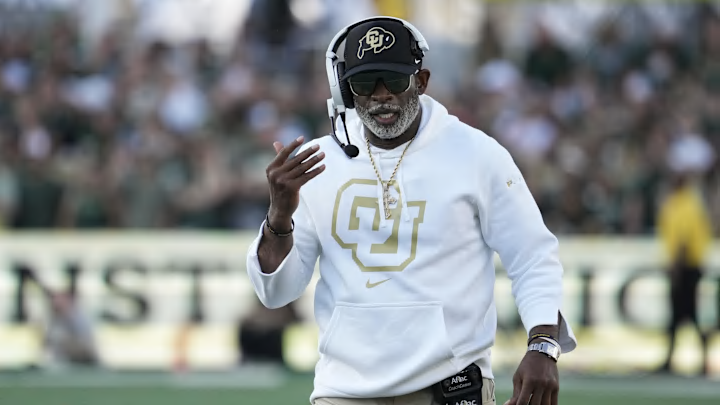CBS announcers questioned Coach Prime's end of game play calling vs. Colorado State

On a night where Colorado played one of the best games in the Coach Prime era, the final possession in the fourth quarter became a topic of conversation. After a tense start in Fort Collins the Buffs were on the verge of sealing a win against in-state rival Colorado State. They had done enough to secure victory and could have run out the clock by taking a knee. Instead, Colorado quarterback Shedeur Sanders remained in the shotgun formation, launching passes downfield. This strategy baffled many, including CBS color analyst Ross Tucker, who openly questioned the decision on the broadcast.
Tucker speculated that head coach Deion Sanders was driving the aggressive play-calling. He found it hard to believe that Pat Shurmur, Colorado’s offensive coordinator and a veteran coach with significant NFL experience, would make such a call. Shurmur’s background, which includes three stints as an NFL head coach, suggests a more conservative approach in these situations, particularly to avoid unnecessary risks.
“They snapped the ball with 11 seconds on the play clock,” Tucker remarked, expressing his concern. “That is not smart… I got to be honest with you, I think this has got to be coming from Deion Sanders. Because I just can’t imagine this is what Pat Shurmur would want to be doing in this situation. I mean, he’s a three-time NFL head coach. I think Pat would just be taking a knee and not taking a chance of any offensive lineman getting hurt or the quarterback getting hit again.”
What Deion Sanders said after win over Colorado State
Tucker’s skepticism grew when Colorado snapped the ball again on a 4th and 6 play with just a minute left on the clock. Shedeur Sanders threw an incomplete pass behind the line of scrimmage and was hit by a Colorado State defender. Tucker emphasized the potential risk of injury, especially if Sanders had taken a hit that could have sidelined him. Such a scenario would have overshadowed the victory, turning the narrative from a triumphant rivalry win to a cautionary tale of unnecessary risk-taking.
CBS announcers Rich Waltz and Ross Tucker couldn't believe that Deion Sanders still had Shedeur Sanders throwing passes and taking hits while leading by 19 in the final minute of the CU-CSU game. 🏈🎙️ pic.twitter.com/eNsQRY2V0I
— Awful Announcing (@awfulannouncing) September 15, 2024
“Could you imagine what we would be saying all week if Shedeur Sanders got his throwing arm hit in a game where they’re up 19 with less than a minute left and they could have taken a knee? I have not seen very many teams, in my life, in NFL or FBS football do that. It’s a really interesting choice,” Tucker said, highlighting the rarity of the decision in football at any level.
The broadcast team, including play-by-play announcer Rich Waltz, speculated on the possible motivations behind Colorado’s strategy, suggesting it could have been fueled by the pregame trash talk from Colorado State. They noted a similar occurrence against North Dakota State, where a risky approach nearly led to a shocking comeback by the Bison.
Coach Prime admitted in an interview that the team was trying to get Travis Hunter to 100 receiving yards, which they achieved. Outside of Hunter’s milestone, there was little explanation for the approach.
Despite the scrutiny, Colorado emerged victorious in both games, using the win over Colorado State as a potential momentum builder as they head into Big 12 play. The decisions may have raised eyebrows, but for now, the wins keep stacking up for Sanders and his program.
